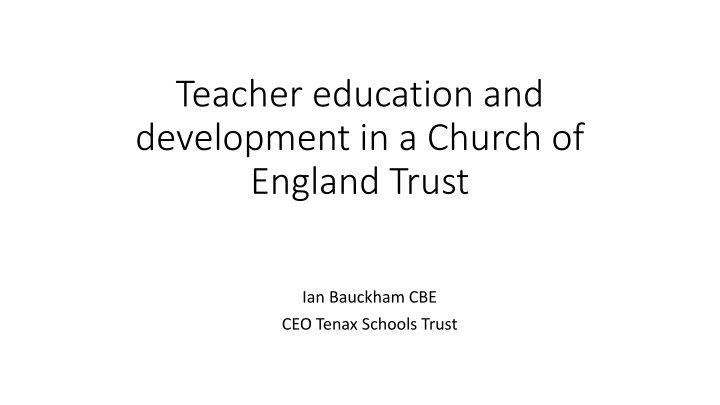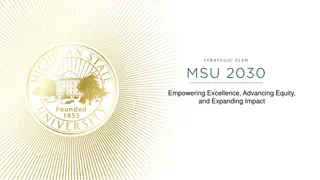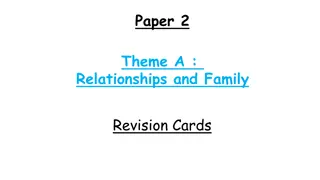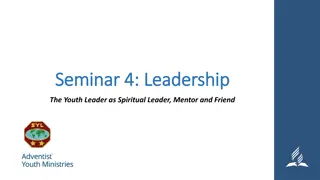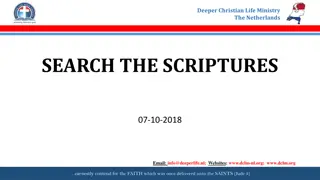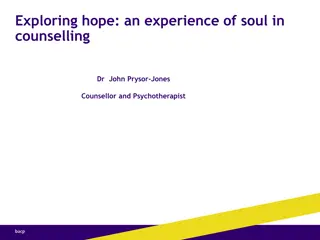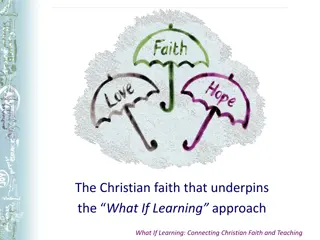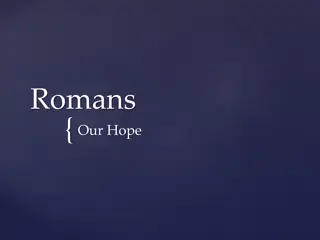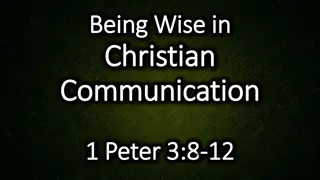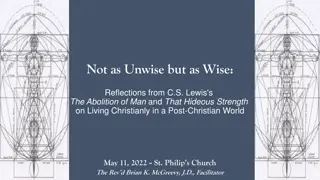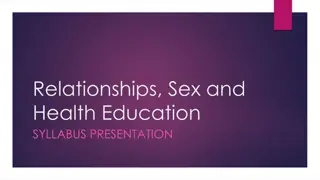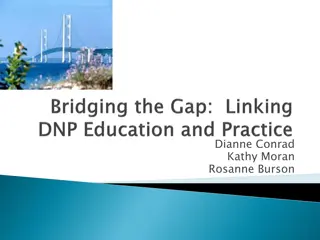Christian Principles in Education: Advancing Hope and Relationships
Focusing on Christian foundational principles in education, this content emphasizes nurturing the calling to teach and lead, transmitting knowledge across generations, and fostering relationships underpinned by hope. Upholding a Christian vision of education, it highlights the importance of community, service, and rejecting determinisms in educational approaches. Leadership, ethos, and a focus on the disadvantaged are central themes, promoting a holistic view of education that goes beyond academic excellence.
Download Presentation

Please find below an Image/Link to download the presentation.
The content on the website is provided AS IS for your information and personal use only. It may not be sold, licensed, or shared on other websites without obtaining consent from the author.If you encounter any issues during the download, it is possible that the publisher has removed the file from their server.
You are allowed to download the files provided on this website for personal or commercial use, subject to the condition that they are used lawfully. All files are the property of their respective owners.
The content on the website is provided AS IS for your information and personal use only. It may not be sold, licensed, or shared on other websites without obtaining consent from the author.
E N D
Presentation Transcript
Teacher education and development in a Church of England Trust Ian Bauckham CBE CEO Tenax Schools Trust
Context Bennett Memorial Diocesan School Church of England Academy in Kent 1500 NOR and growing, academically strong MAT of 8 schools (others all primary) including one free school, and another in pipeline mostly CE schools Altius Teaching School Alliance c40 schools in west Kent and East Sussex SCITT Teach Kent and Sussex from 2017 25 trainees, primary and secondary this year, rising to 40 next year Successful SSIF bid in round 2 - 450k for secondary maths locally
Christian foundational principles Excellence inside our schools and for our pupils is not enough also need to turn outwards and take responsibility for neighbours Having faith and investing in all pupils and staff people are called to teach and lead and we must nurture that calling Transmission of objective truth and accumulated knowledge from one generation to the next tomorrow s challenges will find solutions in the collective wisdom of the past Christian vision of education does not see pupils as future economic units, but as future adult members of our society who need to share in common inheritance in order to find their true freedom through connectedness and service.
To be truly Christian in approach special attention must be given to the poor in other words those least advantaged educationally A Christian approach mandates us to reject all determinisms in education, especially social and genetic determinism At the heart of our church schools is relationship with God and with one another. Teacher education & development developing the depth of understanding to create relationships underpinned by hope. Leadership not just the destination but how we journey to that place Ethos enables relationships that work, happy, confident, envisioned people that enjoy the journey and get to the destination much more successfully. Jo Glen, former Headteacher, education/leadership consultant & coach
offering hope of a new start But, happiness need not be simply selfish or self-indulgent. What if it is about opening people's eyes to joy, awakening curiosity and teasing the imagination, offering hope of a new start and helping people hear amid the cacophony of the present the music of the future? What if making people happy has to do with enabling them to know that however dark life gets, the light cannot be extinguished? That they are loved to death and beyond? Rt Rev d Nick Baines: blog 27th September 2013
Educational philosophy Education is primarily the transmission of knowledge the well-stocked mind is the skill of skills (Hirsch) The curriculum is best organised in domains to allow networks, schemas, to be created and to embed in the long term memory and permit cognition, problem solving and creativity social justice demands this is the curriculum for all for as long as possible Pedagogy is a science which lends itself to research there is effective pedagogy which we can discover through research and teach to teachers and as we discover it we are morally obliged to universalise it Social justice demands we find the best pedagogy as the least advantaged suffer disproportionately from ineffective teaching Rejection of determinisms of all kinds especially social and genetic in for example curriculum choice and (ab)use of the concept of ability
So, where's the evidence? The importance of meta studies rather than small scale research projects: Robert Coe John Hattie Education Endowment Foundation Network of Research Schools
Leadership is a science susceptible to investigation and research Two broad types of school leadership: instructional and transformational (Hattie, Robinson) Transformational leadership focuses mainly on inspiration, energy, commitment to common moral purpose Instructional leadership focuses mainly on getting learning climate right, clarifying curricular / pedagogical expectations, setting high expectations of outcomes Instructional leadership has significantly stronger impact when assessed in large scale studies Leadership approach
Teacher retention is the solution to teacher supply (8% leave before retirement each year) Why? Is the answer as simple as long hours? Maybe not Is the answer as simple as too low pay? Maybe not NFER research (2015) into teacher retention showed job satisfaction was by far most powerful protective factor against teachers leaving the profession Teachers lack job satisfaction because they are not equipped to do effectively what is needed for education to meet its purposes, and they are constantly thrown off course and undermined by distractors The challenge of teacher supply and retention
Curriculum and pedagogy Teacher development Instructional leadership Three priorities
What, no CPD programme? Question asked by Ofsted in 2012 In fact, development of teachers completely integrated in all aspects of school life Staff briefing, subject meetings, head of department meetings, pastoral meetings are all structured around research-based themes and think pieces shared across whole staff explored and debated in a thematic cycle, so all professionals have a shared understanding and a common language Planned and organised across the whole year so it has a shape and a coherence Almost no external training; the shared professional life of teachers should BE CPD total embedding
Example themes Cognitive load theory and its application Using the worked example Extraneous and germane cognitive load What explicit instruction really is, and isn t Purposeful practice (and practice which is not purposeful) Improving reading comprehension through building domain knowledge
Aspiring Leaders programme Need to create an internal leadership pipeline Comparison with other sectors employing young graduates Early introduction to principles of instructional leadership Importance of feeling valued and invested in Fifteen places per year Started in secondary but now open to wider Trust and TS group High promotion rate (mostly internally) Programme research and evidence based and largely around our educational vision
Aspiring leaders outline The vision, values and ethos underpinning successful schools Securing and sustaining high achievement in schools; developing, improving and sustaining high quality teaching, data informed dialogues, thinking about closing the gap , addressing current educational theories Effective principles of rewards and sanctions Fundamental principles of formative and summative assessment Effective & accurate communication in a multi media age to parents, students, staff and governors. The principles of leading an overseas or residential visit. How we address this: Four twilight seminars Half day seminar led by a NLE from outside the geographical area of the alliance/trust to reflect on their leadership, leadership styles and role play of leadership scenarios Day visit to a partner school Day work shadowing senior leader Impact initiative project
Other Teaching School activity Lecture and seminar series with speakers with a national profile becomes large regional event e.g. Prof Rob Coe, Daisy Christodoulou Subject specialist network events Course provision such as OTP & ITP Partners for NPQSL, NPQH, NPQEL
Church of England NPQH One of core group of partner schools who are the named providers of this distinctive programme now around 100 applicants nationally for this pilot launch year, with large numbers from SE dioceses Know yourself as a Leader Create a culture of Excellence Lead teams with Dignity and Respect Be a Community Builder Enable children to Build Character Build your Organisation
NPQEL One of a consortium of four schools and ASCL PD offering the new NPQEL programme because we believe in the school led system and the need for well led groups of schools in that landscape Attracted over 100 applicants nationally, of whom 1/3 in SE region Ethical leadership distinctive dimension growing and deploying people ethical leadership and change management curriculum excellence across the group of schools business development, growth and sustainability school improvement strategy across the group of schools MAT governance and risk management safeguarding and health and safety across the group of schools reputation, brand management and marketing data and accountability across the group of schools horizon scanning and influencing
SCITT Teach Kent & Sussex Pragmatic and principled genesis Cross-cutting group of schools, led by Bennett and the Trust Primary and secondary Distinctive approach to early teacher education, again centred around our approach Importance of developing subject knowledge Evidence based research on effective teaching Professional development led by combination of teachers, school leaders, university academics and researchers; some with a national profile Support CPD and coaching on class management; one of the biggest fears of potential trainee teachers
SCITT trainee professional development programme topics Building ethos and values leadership at the heart. Brett Wigdortz on Teach First philosophy, the trainees] would be expected to be leaders. Classroom leaders from the start working with their students to prove the maxim that true leadership is leading people to a place they need to get to when they themselves don t believe they can get there. Principles of effective teaching fully guided teaching , subject knowledge, knowledge rich curriculum, cognitive load theory, growth mindset, effective questioning, scaffolding, modelling Teaching for social justice, principles of gap closing, powerful knowledge Establishing confident, leading presence in classroom & the school Valuing all the role of ethos, positive behaviour systems and structures The purpose of education achievement, progress and underpinned by deeper moral value Building relationships in school, parents, other agencies. Theories of assessment addressing confusion of formative and summative Child development Safeguarding and wider pastoral care Extra curricular provision
Strategic School Improvement Fund Rationale for successful 450k bid connection to our philosophy of education which in turn springs from our Christian principles Evidence based approach to effective interventions in maths focus on quality of teaching and embedding effective practice into every day classroom work Closing the gap for disadvantaged best pedagogy is best for everyone; disadvantaged have less resilience to substandard pedagogy
Strengthening Qualified Teacher Status Government proposals: consultation open to 9th March We support proposals, especially the proposal to develop structured early career content to include subject and curriculum knowledge, evidence based pedagogy including subject specific pedagogy, use of and engagement with evidence and use and understanding of assessment (paragraph 37) Consider responding to the consultation on https://consult.education.gov.uk/teaching-profession- unit/strengthening-qts-and-improving-career-progression/
Discussion How do you articulate your Christian principles and how do they inform, shape and guide what you do as a school? What is your educational philosophy? How does it arise from your Christian foundation? How does it inform your professional development approach? How do your drive this approach through your organisation in practice? How do you hold it close to your principles and guard against it becoming a response to external pressures? How can the proposals in Strengthening Qualified Teacher Status be implemented with Christian character and purpose running through them?
Further reading Sam Sims and Rebecca Allen forthcoming book Deans for Impact: Science of Learning and Practice with Purpose E D Hirsch: Why knowledge matters Cognitive Load Theory: Research the teachers really need to understand Centre for Education Statistics and Evaluation, NSW Becky Allen blog: If Engelmann taught swimming Michael Young paper The curriculum and the entitlement to knowledge (2014) Daisy Christodoulou Making Good Progress
